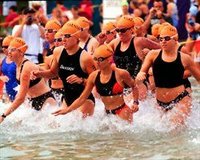Wednesday, August 16, 2006
The 9 Disciplines of Triathlon
 I am often asked what it takes to be a triathlete, and given that I am a rather mediocre one, I tend to have to work harder on the few gains that I make over time. When I complete an Ironman, people asked me how I could ever bring it off.
I am often asked what it takes to be a triathlete, and given that I am a rather mediocre one, I tend to have to work harder on the few gains that I make over time. When I complete an Ironman, people asked me how I could ever bring it off.I would often reply that it has more to do with scheduling and discipline than anything else involving swimming, cycling and running, which is what most people do not realize.
I thought about it some more, and came up with the following list of must-haves, beyond a mere ability to do the three sports.
The 10 Essential Disciplines of Triathlon
- drilling
- eating and drinking
- resting
- sequencing and planning workouts
- clothing/equipping/packing
- injury recovering
- racing
- calendaring and time budgeting
- researching
- money budgeting
1. Drilling: the skill and patience required to repeat the same activity over and over in a discipline that focuses on one single action, with the hope of building new skill in the overall activity. For example, when a pianist does scales over and over, it is not because he or she will ever do them in competition or performance. Likewise in triathlon, and especialy in swimming, drilling is critical to improving performance.
2. Eating and Drinking, or nutrition, includes what the athlete consumed during racing, before racing and after racing. Everyday meals also need to be tracked carefully.
3. Resting is said by some to be even moe important than long work outs, because this is the time when the body does the important ob of rebuilding after exertion.
4. Sequencing and Planning Workouts involves using a training philosophy and a set of race-preparation principles to build a schedule of activity that covers several weeks, involving training as well rest, and hard weeks with weeks of reduced activity.
5. Clothing, equipping and packing involves picking the right equipment to wear and use, and learning to pack the right amount for races, and how to ship it from place to place. There are numerous choices to be made, and all must work together and be maintained.
6. Injury recovery is a capacity that every triathlete must have in order to respond effectively to inevitable overuse problems and accidents. Learning how to stop training activity is important in helping the body to heal itself.
7. Calendaring and time budgeting is probably the single skill that separates the triathlete from the wannabees. While many people can muster the physical talen to complete even the smallest of races, most are stopped by an inability to schedule themselves to complete the required training. I use the Getting Things Done approach to arrange my calendar of activities, including training dates. For the vast number of triathletes who are non-professionals, this means fitting in workouts into busy lives tha include many other items of competing interest.
8. Researching means finding good sources of information, and using them to do every aspect of the sport, including these surprising disciplines. There is a growing body of knowledge regarding the sport, most of which is online and some of which is in print. The ability to find this information is important.
9. Money budgeting - most triathletes are busy people who live with finite budgets and cannot afford top of the line equipment. They must make choices as to what to invest and when, and someone who cannot make a budget and stick to it will not last long in the sport!
Mastery of these 9 disiplines are second only to a basic ability to do the three sports, and the skills that enable an athlete with potential to move from merely having talent to realizing results. For the average athlete, these skills mean the difference between enjoying the sport, and worrying about it or dropping out altogether because on of them is missing.

